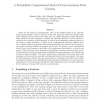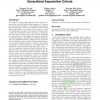61 search results - page 3 / 13 » Learning word normalization using word suffix and context fr... |
COLING
2000
13 years 7 months ago
2000
In this paper, word sense dismnbiguation (WSD) accuracy achievable by a probabilistic classifier, using very milfimal training sets, is investigated. \Ve made the assuml)tiou that...
ICONIP
2009
13 years 4 months ago
2009
In contrast to traditional machine learning algorithms, where all data are available in batch mode, the new paradigm of streaming data poses additional difficulties, since data sam...
COGSCI
2010
13 years 6 months ago
2010
Words are the essence of communication: they are the building blocks of any language. Learning the meaning of words is thus one of the most important aspects of language acquisiti...
SIGIR
2008
ACM
13 years 6 months ago
2008
ACM
It is difficult to apply machine learning to new domains because often we lack labeled problem instances. In this paper, we provide a solution to this problem that leverages domai...
BMCBI
2010
13 years 6 months ago
2010
Background: Word sense disambiguation (WSD) algorithms attempt to select the proper sense of ambiguous terms in text. Resources like the UMLS provide a reference thesaurus to be u...


